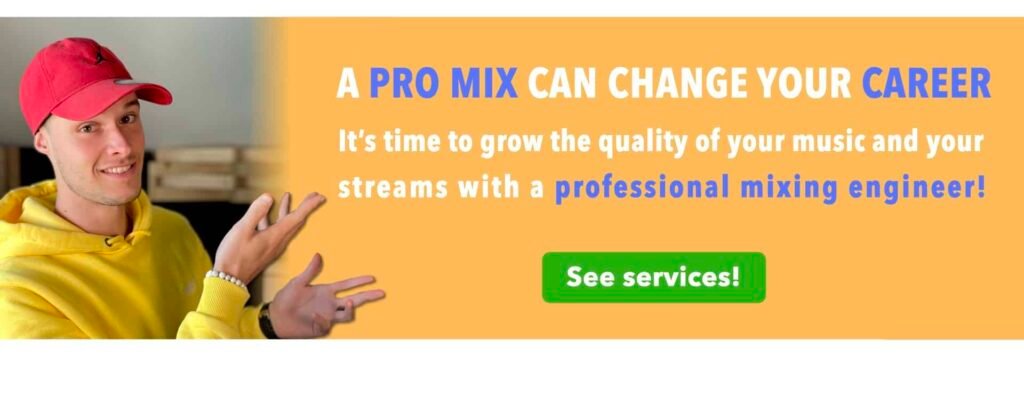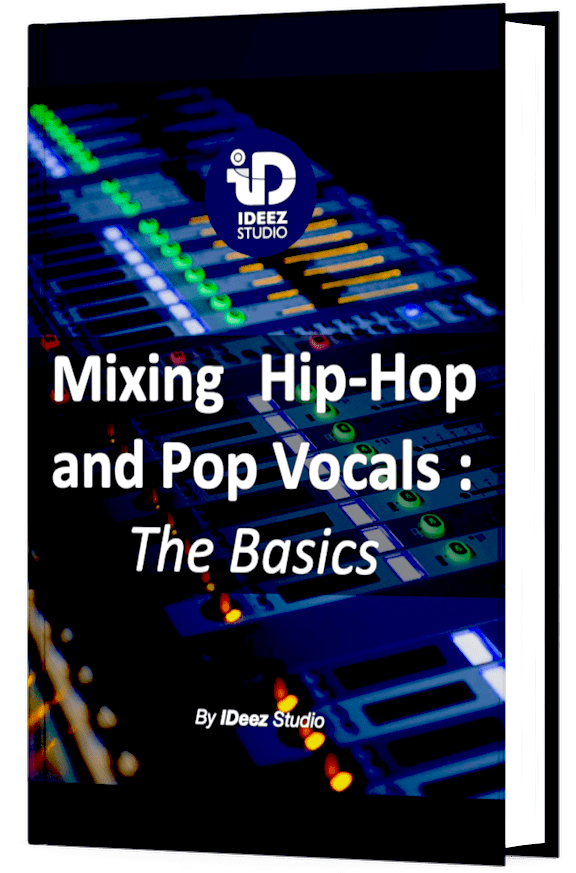Being a professional mixing engineer, I often get this question from my clients, “Do I need to buy plugins to mix music professionally?”. The answer will depend on your level of mixing, your needs but also the budget you have for everything related to music. In this article, I give you all the information you need to make the best choices for your productivity, but also for your wallet!

In most cases, you don’t need to buy plugins to mix music professionally. Always keep in mind that paid plugins should not be seen as a way to get pro results, but as a tool to help your music mixing skills. Good plugins without good skills are often not very effective or even useless in order to get pro sounding mixes.
Paid plugins don’t Always mean quality
Many beginners in music mixing are convinced that buying paid plugins will instantly improve the quality of their mixes. That these plugins will make the sound more professional without any real effort. This is not true. This idea must be removed from the minds of all mixing enthusiasts.
In fact, you shouldn’t be fooled by all the videos on the web. Showing mixing professionals (sometimes not) using super expensive plugins to work on their projects. It’s very appealing, for sure. But these people have years of experience that allow them to use these kinds of plugins with great ease and efficiency.
But if these mixing engineers or producers create quality music, it’s because of their skills, not because of the plugins they use. Concretely, the choice of plugins and their “quality” should depend on the evolution of your skills. But you shouldn’t expect the opposite.
Also important, always keep in mind that some paid plugins are not of great quality, sometimes even quite the opposite. Or they are simply not adapted to your needs.
In terms of pure quality, I can assure you that some free plugins are better than paid ones. Or that some $25 plugins are better than others at $150. In short, the selling price of audio plugins is not always directly related to its quality.
For example, some Waves plugins, known to be very affordable, are objectively better than some UAD plugins. Even if the opposite could be true too.
When you think about buying plugins, always take the time to look at reviews, get informed and compare the choices.

The skills-needs-budget principle
When you buy plugins, or any audio related tools, I advise you to always think about the skills-needs-budget principle. This very simple principle allows you to know whether or not it’s worth buying a certain plugin or not.
This means that your choice of tool, be it plugins or hardwares, should always depend on these three things which are your skills, your needs and your budget. The first one being the skills and the last one the budget, in terms of priority.
In a purchasing situation, the ideal is to fulfill these 3 criteria with a yes. If a “no” surfaces, then I advise you to work on that before moving on to the buying stage.
This very simple principle applies to any trade or activity that would require specific tools to work properly.
A. Skills
The first thing to consider before shopping for plugins is your skills. Do you have enough music mixing skills to use paid and/or complex plugins?
It is very important to keep in mind that professional plugins, and therefore potentially paid plugins, do not work by themselves. They need to be handled by someone who knows what he/she is doing with his/her mixing tools and who is up to speed with the plugins he/she is using.
I know that expensive plugins are often more attractive than others, but when buying, one must be able to judge his/her skills in a lucid and humble way.
If, after buying a plugin, you realize that you don’t have enough skills to use it in the right way, you will have simply made a useless purchase. And you will have wasted time and money on something that is not worth it. This can lead to a lot of frustration and therefore lack of productivity.
What are good mixing skills?
But having good mixing skills, what does that equate to? It actually equals several things.
- The first is being able to use the basic tools of compressor, EQ, reverb and delay smoothly and efficiently. If you spend a lot of time wavering over parameter values, that’s a bad sign.
- The second is to have all the basics of music mixing in general. Balance, volume, gain staging, auxes, groups,… There are a lot of basics to master before getting to a proper level.
- The third one is simply to be able to deliver quality music through your mixes. I’m not necessarily talking about a 100% professional result, but something that can be listened to relatively comfortably by a musician, a producer or a sound engineer. If you can achieve this kind of result, it’s a very good thing!
What if you don’t have good mixing skills
The first thing I would say to you, if you feel, in all objectivity and humility, that you don’t have good music mixing skills, is to wait before buying anything as paid plugins. Because it would be a useless purchase that would be counterproductive.
But humans are made to evolve! You could very well have enough skills within a few months, if you practice often and force yourself to use only basic free plugins.
Beginners in music mixing don’t realize how rewarding it is to force yourself to do this in the learning process. Trust me, it will only benefit the rest of your learning process. And the results you can get with free plugins can often be surprising.
You can also do some very simple things to improve your mixing skills. I talk to you more in depth in this article about the 5 things you can do now to improve your mixing skills quickly. I also talk about it in this video:
B. Needs
In audio, and especially with plugins, it is imperative to make a difference between what you need and what you want. You must be able to confirm to yourself, in all lucidity, that, yes, you really need one or more plugins to improve your productivity, your efficiency or simply the quality of your mixes.
Without a real need, there is a big chance that the plugin(s) you are about to buy will be under-used and therefore not profitable. If you buy a plugin, be sure that you will use it very often for your recording, mixing or production sessions.
In the music production community, of which we are both a part, 95% of us would like to buy all the best plugins on the market. But in reality, only 2% of us really need them. Which is a very small percentage.
When do I know you really need it?
But how do you know when you really need more plugins? Normally, it smells pretty easy in a natural way. But you’re obviously not here for me to tell you to follow your instincts. So I’m going to give you a concrete situation to make sure you do it at the right time.
The perfect time to think about buying plugins is when you feel that you are starting to be limited in your creativity and the tools at your disposal. Not before. Not after.
It’s a kind of repetitive obstacle that repeats itself in several sessions and blocks you at a certain point in your mixing process.
Adapt your choice of plugins to your needs
Whatever you choose as a plugin, it must always be adapted to your needs. In the sense that you won’t go from no need to hundreds of plugins overnight.
Don’t buy more than you need at the moment. Because it could quickly become expensive for the use you make of it. Most manufacturers allow you to upgrade from bundle to bundle, which allows the user to upgrade his plugin library without any rush. Take advantage of this!
C. Budget
The last element to take into account in your choice of plugin purchase (or not) is obviously the budget you would be willing to put into plugins.
This may seem super obvious, but yet, some people, including many beginners in music mixing, spend astronomical amounts of money on plugins without giving themselves a budget. Or going completely over budget.
Even though it may seem obvious, my only advice is this: always keep an eye on your budget before buying any plugin or bundle. Because you might quickly regret it and realize that for the price, you would have put your money in something else.
Second tip: always try to spread out your purchases over a longer period. Why?
- First, because it’s always better for your wallet to spend several small amounts of money over several months, than to spend a large amount of money in one go. It always hurts a little.
- And secondly, because when you buy several plugins at the same time, let’s say in a bundle, there are always plugins that you don’t use or even try. This means that these plugins are… useless!

When it comes to budget, don’t force it!
A budget means what it means, it’s a limit that you can’t (normally) exceed for one or more purchases. I advise you not to increase this limit just for one plugin or bundle. This allows you to keep a certain constancy but also to keep it healthy.
It will also avoid any kind of compulsive buying, which can happen very quickly with plugins. Quicker than you think!
Focus on Education rather than tools
As already mentioned at the beginning of this article, plugins should only be a support to your music mixing knowledge, not a means in itself. So you will have understood, the priority in the learning process in mixing is to invest in education first.
When I talk about education, I don’t necessarily mean going to sound engineering school. I’m talking about platforms like Mix With The Master or Nail The Mix. These (paid) platforms feature professionals and even legends of mixing, recording and music production who give you all their techniques and secrets to improve the quality of your music.

If you really want to improve your mixing skills, I strongly advise you to go through these platforms. It’s an investment that can pay off very quickly if you apply the pro tips that are given to you in the videos.
But that’s not all. It’s always a good idea to get information from people close to the music business. Even if it’s not directly related to music mixing. Let’s not forget that music is art. Any source of inspiration is good to take, whether it is technical or artistic.
If you have one or more acquaintances who work in this field, contact them, ask them questions. And I can swear that, indirectly, the quality of your music will be improved.
But let’s get back to our main topic, paid plugins!
Simple Tools First
When I am asked questions related to plugins and mixing tools. I always give this sentence that sums up the situation perfectly in regards to paid plugins:
It’s always better to use free, simplistic plugins that you know well than to use paid plugins the wrong way.
This often makes you think about the real usefulness of paid plugins. In fact, you should not skip any steps in your learning process. Start by using simple tools, learn to use them correctly, master them 100%. And only then you can think about upgrading to paid plugins.
So if you are about to buy plugins, ask yourself this question: “Do I already know the basic audio mixing tools like compressors, EQ, reverbs, delays and other processing tools?”

Are you going to use them?
Bundles, packages, series,… All these concepts adopted by many plugin builders are cool. But do you really need them? Are you sure you will use these plugins for your next projects?
Of course, we have to be honest. There will always be some plugins that are less useful than others in everything related to bundles, but you should try to limit this number as much as possible.
Whether it’s with plugins or not, there’s nothing worse than buying something useless, especially when you’re talking about large sums. So, if you don’t have a real need to buy the plugin(s) you’re about to get, just don’t get them!

Conclusion
To answer the initial question of this article: No, you don’t need to buy paid plugins to mix music professionally. If you master all the tools at your disposal, you can always get a decent or even pro quality at the end of the road.
But… all these plugins are not there for nothing. The reason they exist is to be able to reach pro quality faster and more efficiently through your mixes. But do you have the ability? Do you need it? And do you consider the investment that it represents?
When you are about to buy plugins, always consider these 3 criteria: skills, needs and budget. The first one being the most important of the 3. If you are missing one of these 3, you don’t need to buy plugins. It’s better to focus on learning how to get pro mixes with free and basic plugins.
If you have any questions about this topic or anything related to music mixing, please contact me, I’m always super happy to help!
My favorite tools for mixing pop and hip-hop music:
Plugins
In the field of auto-tune, I’m convinced that nothing’s better and more efficient than Antares Auto-Tune Pro. As for the EQ’s, FabFilter Pro-Q3 and Slate Digital Infinity EQ are, in my opinion, the best tools. For compression, I have 2 favorites plugins: Waves RComp and UAD EL8 Distressor.
As for reverb, I’m a big fan of the Soundtoys Little Plate, but generally, I go for the Valhalla VintageVerb for its versatility. I also love the Arturia Rev PLATE-140 and the UAD Pure Plate for its organic side.
Headphones
The closed headphones I love and will always love using for mixing pop and hip-hop music are the Beyerdynamic DT-770. As for the best open-back headphones, I use the Sennheiser HD600 headphones, and I’m really happy of them!
Monitors
Having a pair of Yamaha HS7 in its studio or home studio is always cool for more excitement while listening to your mixes. The Adam Audio T7V monitors are also super accurate. In my studio, I also have a pair of Genelec 8030 for their reliability.
Hardware gear
For anyone who wants to start using hardware in their mixes, I always recommend these 2 units from Klark Teknik: the EQP-KT and the 76-KT. Don’t forget to use good converters, such as the Apollo interfaces. This is essential for a good rendering.






